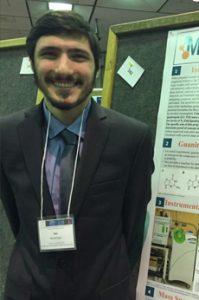Major: Biochemistry and Molecular Biology

Avi is pursuing a B.S. in Biochemistry and Molecular Biology (2020). He is a UMBC Merit Scholar, a MARC U*STAR Scholar, and a Meyerhoff Affiliate Scholar.
Currently, my research focuses on developing the methodology for the detection of trace amount of N2-Ethylguanine using liquid chromatography, triple quadrupole (LC-TQ) mass spectrometry instrumentation. My emphasis is on N2-Ethylguanine as it serves as a potential biomarker for Fetal Alcohol Syndrome (FAS), and therefore the detection of trace amounts of it could lead to early detection of this disorder in newborn or young children, and in turn, earlier treatment.
How did you find the research opportunity?
I found this opportunity through lots of emails and discussions with professors. I sent 10+ emails before finally joining the Molecular Characterization and Analysis Complex (MCAC). After meeting with Dr. LaCourse and the MCAC team, I was asked if I wanted to join as an Undergraduate Researcher, and I haven’t looked back since.
Who is your mentor for your research?
My mentor is Dr. William LaCourse, in the department of Chemistry in Biochemistry. I thought Dr. LaCourse’s lab would be a good fit as the field of Bio-Analytical Chemistry seemed like the perfect interface of Biochemical research I was eager to become a part of.
Do you get course credit for this work? How much time do you put into it?
I’ve been doing research for purely the experience and for credit. I am currently enrolled in CHEM 399, have completed two semesters of PRAC 098, and have already enrolled for CHEM 499 for the coming spring semester. On average, I put in about 12 hours a week during the school year and around 40 hours a week during academic breaks.
How did you learn what you needed to know to be successful in this project?
Though my background in Biochemistry helped, I learned most of the complex analytical technique from my research mentors in the lab. Since I had yet to take Analytical Chemistry prior to joining, it was necessary to pick up the skills and knowledge needed while on the job.
What was the hardest part about your research?
The hardest part is the patience and resilience needed to be an effective researcher. Sometimes, it will take days or weeks to finally achieve some semblance of the results you were looking for. Rather than sulk in defeat, try to understand what could’ve went wrong and how you could fix it during your next attempt. This process is instrumental to anyone who wants to be a successful researcher.
What was the most unexpected thing?
The most unexpected thing is how close I’ve become with everyone working in my lab. They’ve become a second family to me, and we help each other with any problems we may have.
What has been the most rewarding part?
The most rewarding part has been being able to see my research develop from an idea to a reality. It’s been a lot of hard work, but it has definitely paid off!
How does this research experience relate to your work in other classes?
Since I do research in an Analytical Chemistry laboratory, I am able to directly apply my research experience to my course work in Chemistry and Biology. Specifically, all of what I’ve learned so far in Analytical Chemistry, the spectroscopy sections from Organic 2, the molecular biology I’ve learned from my Biology coursework, and all the basic laboratory techniques I learned in my Chemistry/Biology lab courses.
What is your advice to other students about getting involved in research?
My greatest token of advice would be to start early! Research is an incredibly rewarding and unique experience that you will not obtain from any class. It brightens up my day and validates all the effort I put into academics outside of the lab. Also, don’t get discouraged if you don’t find a lab at first, as sometimes despite being qualified, a research professor just doesn’t any spots open. Be persistent and soon you’ll find the lab of your dreams!
What are your career goals?
My career goals include obtaining a Ph.D. and then becoming a research professor or full-fledged researcher!
What else are you involved in on campus?
Along with research and classes, I’m also the VP of the UMBC Chemistry/Biochemistry council of majors (ACS), a TA for BIOL 141, an LRC tutor, and a member of the Global Brigades service organization, meditation club, Jewish Learning Connection, Vietnamese Student Association, and Korean Student Association.
How will you disseminate your research?
I have presented my research at both the Summer Undergraduate Research Fest (SURF) and Undergraduate Research Symposium (URS) here at UMBC and plan to present at URCAD and at the American Society for Mass Spectrometry (ASMS).
11/28/18